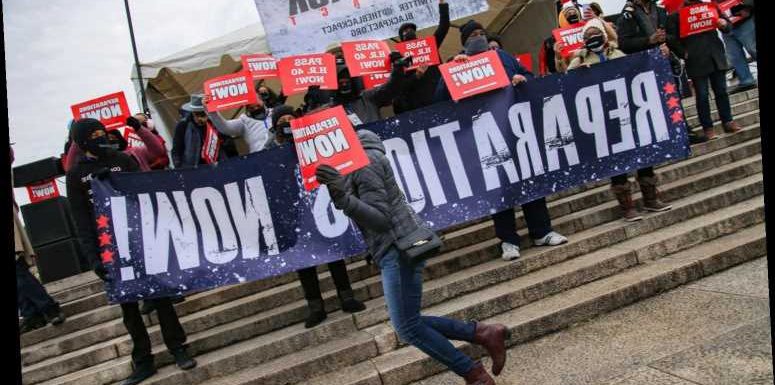
THE city of Evanston, Illinois voted to APPROVE the first system of $25,000 slavery reparations for black residents in the United States.
The city will now begin paying out $25,000 payments to black community members, as part of a $400,000 payment the council voted on Monday night.
In an 8-1 vote, members of the Evanston city council approved the funds to be doled out, WGNTV reported.
The payments will be given to 16 community members to be put toward housing.
Reparation payments to be paid out are part of a $10million plan backed by the city council that are to be paid out over the next decade.
Evanston is the first US city to offer reparation money to black residents whose families suffered damage from discriminatory practices, including racist housing policies.
The $10million fund was raised from a three percent tax on the sale of recreational marijuana as it tries to address inequity in housing.
Evanston's reparations program received mixed reactions – with 9th Ward Alderman Cicely Fleming noting that resident's don't have a say on how funds are doled out, WGNTV reported.
She noted that money may go directly to mortgage lenders.
"As a housing program I think it’s great,” she said. “As a reparations program, it falls very flat to me.”
Once the program is underway, other cities looking to establish their own reparations plans could look to Evanston as a model.
Chicago; Providence, Rhode Island; Burlington, Vermont; Asheville, North Carolina; and Amherst, Massachusetts, are among the cities that have already launched initiatives supporting the awarding of reparations.
Yet, no specific funding has been identified to allow initiatives to move forward.
On a national level, a bill to establish a national reparations committees is sponsored by 170 Democratic members of Congress, but the practicality of implementing a program is still up for debate.
President Joe Biden has not endorsed the legislation but supports a study looking into the creation of a committee.
The potential committee has been discussed by the federal government for decades, yet the lack of progress led to the local council in Evanston creating their own Restorative Housing Reparations program.
The program in Evanston, home to northwestern University, was first established in 2019.
The payout is supposed to make amends for the racist housing policies over decades in the city, which is located north of downtown Chicago.
Black residents in the city were formerly subject to "redlining," a practice through which backs refused housing loans to predominantly black neighborhoods.
It kept black communities from home ownership, a key source of wealth.
To qualify, residents must have lived in Evanston between the years of 1919 and 1969, where they were discriminated against in terms of housing.
Residents are also eligible if they're a direct descendant of someone who suffered housing discrimination.
Opponents to the program noted that the first phase of $400,000 will only aid 16 people if handed out in $25,000 bundles, when there are 12,500 black people in the city.
“True reparations repair you – you get a chance to say what it is that repairs you,” said Rose Cannon, a member of the group Evanston Rejects Racist Reparations, who is black.
Even among those in support of the program, some activists have argued that the payments do not go far enough.
Rev Michael Nabors, president of the Evanston NAACP, thinks $25,000 is a "drop in the bucket."
"There is no amount of money in the world that can take the place of the pain and the suffering that was caused emotionally, that was caused psychologically," he said.
There is also concern that some of those eligible will have to submit a home loan application to apply.
Yet it was also referred to as a "nudge" in the right direction.
"We are fully aware that there is a lifetime of work ahead of us to justice and repair for the Black community," said Robin Rue Simmons, the 5th Ward Alderman who spearheaded Evanston's reparations program.
"And we're taking the first step."
“It’s about time that something has come from the hard work of African Americans in this city, proving that they should be treated as anyone else,” Delois Robinson, a black resident of the city, told Reuters.
The Center for American Progress noted in a report how systemic racism has affected black communities for decades.
"For Black communities in urban areas, public policies have often been enacted under the guise of creating new public spaces, combating urban blight, or bolstering economic development," CAP said.
The report continued: "For decades, governments and private citizens have employed exclusionary tactics to prevent African Americans and other people of color from building wealth through homeownership and affordable housing."
Latest data from the US Census revealed white people own homes at nearly 50 percent higher rates than black Americans.
The movement for reparations has gained traction in the last year following months of Black Lives Matter protests in the wake of the deaths of George Floyd and Breonna Taylor.
However, a poll from Reuters/Ipsos in June 2020 found that only one in five agree the US should pay damages to descendants of enslaved people.
Opponents question whether taxpayers can afford to pay out trillions of dollars on a national program.
Others are sceptical that eligibility can be fairly determined.
Source: Read Full Article










